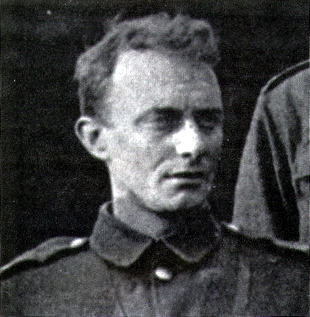'No one cares less than I,This poem by Edward Thomas is the third poem in T.E. Lawrence's notebook of favorite poems which he called Minorities. Thomas earned his living writing prose before Robert Frost convinced him to turn his hand to poetry. He enlisted in the British army at age 38 and was killed in battle in 1917. Lawrence wrote of him: "Edward Thomas wrote very fine poems, and some almost perfect prose. He must have been a beautiful person."
Nobody knows but God,
Whether I am destined to lie
Under a foreign clod,'
Were the words I made to the bugle call in the morning.
But laughing, storming, scorning,
Only the bugles know
What the bugles say in the morning,
And they do not care, when they blow
The call that I heard and made words to early this morning.
This entry in Lawrence's commonplace book is typically minor since its author is not a major poet and it is not set in a major key. In subject matter as well as in its Kiplingesque cadence it also meets Lawrence's intention that the little book contain works that sing. I doubt Lawrence gave a thought to the oddity that his forenames are present in Thomas' full one.
Some sources:
Minorities, by T E Lawrence; ed. by Jeremy Wilson (London, Cape, 1971).
Edward Thomas entry on the Poets.org web site
Edward Thomas
Last Poems, by Edward Thomas (London: Selwyn & Blount, 1918).
T. E. Lawrence to Edward Garnett
Here in full is the letter in which Lawrence praises Thomas.
T. E. Lawrence to Edward Garnett
[Karachi]
1 Mar. 1927.
[Postmarked 3 Mar. 27]
The book is your own fault. I said you might have a text, lacking illustrations, as a gift. You were scornful of this: and sent me a subscription. So all I could do was to ask Pike, my printer, to send you as well-bound a copy as he could. I hope it was a good one. I deplore the waste of money on a book by a judge who knows so very much what books should be. But you are given, by inscrutable fashion, a chance to redeem an extravagance. Sell the thing, now, while it stands at a premium. The son for whom you told me you wanted it, as an heirloom, will much prefer £100 or so.
Your gift of the Allenby pastel is an irresistible thing: but rather overwhelming. It leaves me hopelessly in your debt. Hopelessly, for I see no way in my life and power of ever pleasing you again. My we regard it as yours, while you have walls and I have no walls? Brick by brick I have sold or given away or lost everything I possessed. The course cannot proceed much further, or I will be naked in the world. It's only by rationing my letters to not more than 15 a week (and 15 is nothing of a proportion to those I receive) that I can keep myself in postage stamps. I'm most grateful, for as a portrait of Allenby the drawing is unusually rich, and Allenby is an admiration of mine. The losing all that little private gallery was rather a wrench. I still have a jolly collection of books, and that is all: and the books I haven't handled for six years. They are in St. John's Wood now, I believe, well cared for by a man I met at Oxford, and have liked since.
Edward Thomas wrote very fine poems, and some almost perfect prose. He must have been a beautiful person. I'm glad you are helping to bring him out a little. How much of that you have done! I was sorry not to use your text for the Revolt in the Desert abridgement. I wrote twice to Cape, and asked for the loan of it: but he was presumably afraid that I meant to destroy it, and so do him out of his power to produce an abridgement of his own if I made default. At any rate he would not let me have it: and I could not very well go on protesting to him that if I asked for the loan of a thing he might understand that I meant a loan.
In the end I waited till the last three days, and then ran through a scratch abridgement of my own, not looking for the best things to leave in, but for the best bits to cut out. It will be all the same 100 years hence: or very shortly after my death, a nearer occasion. I suppose the complete text will then be reprinted.
This place, Karachi, is a colourless unrelieved desert, without any of the beauty of clean emptiness, for it is all spotted over with odd military and air force magazines or barracks. If my mind takes to itself the likeness and tone of its natural surroundings, then indeed I shall have achieved Nirvana.
Before that last stage I'd like to have copied out and sent you an intelligent transcript of my R.A.F. Uxbridge notes. If the energy comes to me this year or next I'll do you this final disservice - and convince you that there were not the roots of writing in me. The 'fear of showing my feelings' is my real self.
More thanks. Why do you show so disproportionate a generosity?
T.E.S.







No comments:
Post a Comment